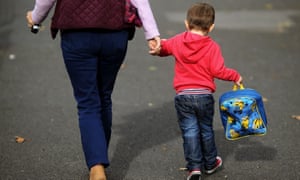The government’s decision to bring back fees will hurt the predominantly female childcare educators and mothers most
History
will remember parts of Covid-19 Australia fondly, I suspect. Like the
way public policy decisions were stripped free of ideological bias and
policy that actually worked for the good of all was quickly implemented.
Like free childcare. Nothing signals to Australians that we have
“snapped back” to the old ways more than the Morrison government’s
public holiday announcement that free childcare is to be dumped come 13
July.
So coated in ideology is everything to do with childcare funding that we have returned to a funding system that even the education minister, Dan Tehan, describes as “quite complex”. And yet it’s this system that is now back, with a few new little extra twists and turns to complicate it even further.
Parents will have to pay fees, but in order to have some control over
what happens, the government has given services an additional subsidy.
Receipt of this funding enables the government to make some demands on
childcare services, such as not increasing their fees until September,
and giving up jobkeeper for their employees. The existing childcare
system comes with a complex activity test that metes out childcare hours
based on the number of hours a parent works. In what’s called a
relaxing of that test (not an abolition as many had counselled should be
done), families will now be able to have 100 hours of subsidised care a
fortnight even if they have lost work because of Covid, but only if
they can prove they really looked (for at least four hours a fortnight)
for new work. Confused? Yes, the snap back is as confusing as the
initial system was, and almost as confusing as the free childcare system
was.So coated in ideology is everything to do with childcare funding that we have returned to a funding system that even the education minister, Dan Tehan, describes as “quite complex”. And yet it’s this system that is now back, with a few new little extra twists and turns to complicate it even further.
But it’s confusing not because organising for children to get access to early education and care while their parents work is inherently complicated, but because the government has a set of beliefs surrounding education and care. They are not beliefs grounded in the value of it to children, or families for that matter. Let’s look at who the decision to go back to charging for childcare will hurt the most and it’s easy to see the ideology these beliefs are coated in.
Going back to paying for childcare will hurt women. The announcement isn’t just that childcare is no longer free – it is also that the first group of employees to have the jobkeeper tap turned off in Australia will be childcare educators. A group that is 97% female and already among the lowest paid workers in Australia. Apparently Australia is a country that gives subsidies to male tradies to fix up houses for those rich enough to afford them but takes subsidies away from those who don’t earn enough to even dream of home ownership.
It will also hurt mothers. No matter how much people would like to consider childcare as something required by both parents, we know that it is almost always the woman who drops her job to look after children when childcare becomes unaffordable, because the reality is that women earn less in Australia than men do. When heterosexual families need to work out which job should go, it often makes more financial sense for it to be the mother’s. And guess what? You can’t get a job if you haven’t organised childcare first. You can’t organise childcare if you don’t have the money to pay for it. Women can’t change that basic equation.
Even mothers who still have some work are going to be badly affected by this. They are about to discover that childcare in Australia is little more under a conservative government than a reward for being a productive member of the economy.
Children are clearly the absolute losers. While the government can pretend childcare and early education are two separate things, they are not. Going back to a system that makes a child’s early education dependent on its family capacity to pay for it, will mean children, especially the ones who need it most, will invariably miss out.
So these are bad decisions for women and children. These decisions reflect the government’s ideology about lifters and leaners, and about women and their value. Is it any wonder that the government makes decisions like this? After all, almost 80% of this government’s representatives (House of Representatives) are men. We voted for a party that doesn’t seem to believe women are good enough to represent an electorate. We get policies that don’t represent women.
Childcare? We got what we voted for.
• Lisa Bryant is an advocate for education and care in Australia and a consultant to education and care services

No comments:
Post a Comment